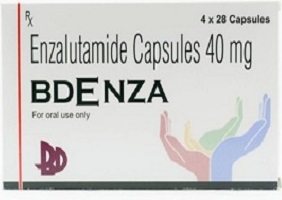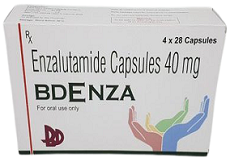Prostate Cancer Symptoms and Treatment: What to Check for

Table of Contents
Bdenza 40 mg Capsule for Prostate Cancer
The prostate gland, a component of the male reproductive system, develops prostate cancer. Many men choose to employ active monitoring since prostate cancer typically spreads slowly and stays in the gland (no treatment). Targeted therapy, prostatectomy surgery, and brachytherapy are all possible treatments for tumors that spread quickly and proliferate quickly (internal radiation).
The prevalence of prostate cancer
Prostate cancer affects one in every nine males at some point in their lives. The second most frequent cancer in men, after skin cancer, is prostate cancer. Numerous effective therapies are available, and some guys don’t require care. Still, the illness claims 33,000 lives in men each year.
What variations of prostate cancer are there?
Adenocarcinomas make up almost all cases of prostate cancer (malignant tumors). This is because the cells of glands that produce secretions are where this type of cancer begins. Rarely do other cancer types spread to the prostate. These include:
- Small cell carcinomas
- Transitional cell carcinomas
- Neuroendocrine tumors
- Sarcomas
Which signs and symptoms accompany prostate cancer?
Rarely do symptoms of early-stage prostate cancer appear. As the illness advances, several issues could arise:
- Frequent and occasionally urgent urination, especially at night
- Weak pee flow or intermittent urine flow
- Unpleasant urination (dysuria)
- Bowel incontinence, or feces
- Erectile dysfunction and painful ejaculation (ED)
- Blood in the urine or sperm (hematospermia)
- Chest pain, hip pain, and lower back pain
- Foot or leg numbness
The treatment of prostate cancer
Because cancer grows slowly and doesn’t spread, some patients never need treatment. The majority of prostate cancers are highly treatable. Treatment choices comprise:
Active surveillance: With active surveillance, you receive screenings, scans, and biopsies every one to three years to track the development of cancer. Active surveillance is most effective when the cancer is limited to the prostate, slow-growing, and asymptomatic.
Watchful Waiting: Active surveillance sounds similar to watchful waiting. However, watchful waiting is frequently employed with elderly or weak patients. This method, like active surveillance, does not start therapy right away after a diagnosis. However, the testing concentrates on symptom management and is conducted significantly less frequently.
Brachytherapy: Brachytherapy, a type of internal radiation therapy, involves implanting radioactive seeds inside the prostate. This strategy protects the nearby healthy tissue.
Beam Radiation Therapy: Strong X-ray beams are directed directly at the tumor during external beam radiation therapy. External radiation therapy, called intensity-modulated radiation therapy, uses high radiation doses to treat the illness’s location.
Systematic therapies: If the prostate gland is not the only site of cancer’s metastasis, your doctor can advise systemic therapy. Chemotherapy, androgen deprivation hormone therapy, and immunotherapy are some of these treatments.
Focal Therapy: A more recent type of therapy called focal therapy exclusively treats the cancerous part of the prostate. If cancer hasn’t spread, you might be able to try this therapy. Options for focal therapy include cryotherapy, high-intensity focused ultrasound (HIFU), laser ablation, and photodynamic therapy.
Prostatectomy: The diseased prostate gland is removed during this surgical surgery. Through small abdominal incisions, surgeons can conduct laparoscopic and robotic radical prostatectomy. Although both of these operations are efficient in removing cancer, they are less invasive than an open radical prostatectomy, which necessitates a bigger abdominal incision.
Bdenza 40 mg Capsule
 Castrate-resistant prostate cancer (CRPC), a stage of prostate cancer where growth continues despite very low levels of testosterone in the body, is treated with Bdenza 40 mg Capsule. Most patients who receive it have disease progression during or following docetaxel therapy. Therefore, using Bdenza 40 mg in females, kids, and teenagers is not advised.
Castrate-resistant prostate cancer (CRPC), a stage of prostate cancer where growth continues despite very low levels of testosterone in the body, is treated with Bdenza 40 mg Capsule. Most patients who receive it have disease progression during or following docetaxel therapy. Therefore, using Bdenza 40 mg in females, kids, and teenagers is not advised.
An example of hormone therapy for males with prostate cancer that has progressed to other body areas is Bdenza 40 mg (advanced prostate cancer).
Men who are not showing improvement from other treatments for prostate cancer are typically offered it. But as the first line of treatment for prostate cancer, you might be given Bdenza 40 mg (enzalutamide).


 Anti Cancer Drugs
Anti Cancer Drugs Hepatitis C
Hepatitis C Meds for HIV
Meds for HIV Ayurvedic Medicine
Ayurvedic Medicine Transplant Medicine
Transplant Medicine Respiratory System
Respiratory System +91-9999064250 / 9811604424 / 9811604444
+91-9999064250 / 9811604424 / 9811604444












